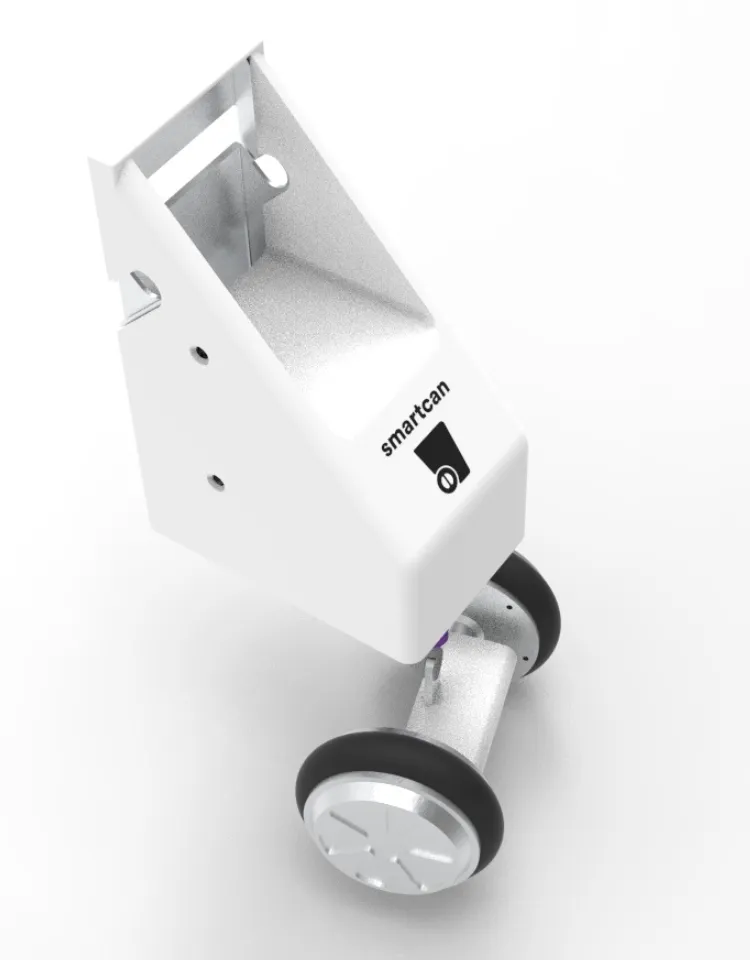This Robotic Trash Can Takes Itself to the Curb
The award-winning invention automates a ‘chore that everyone hates’
/https://tf-cmsv2-smithsonianmag-media.s3.amazonaws.com/filer/fe/10/fe103698-31a1-4b55-99eb-c5e11d0ab8ba/rezzi_2.png)
A major appeal of automation in this era of rapidly developing tech is increasing accessibility and autonomy for disabled individuals. Scientists have created impressive exosuits and robotic gloves for people with limited mobility and motor skills. But for all the advantages of these flashy advancements, they remain pricey, complex and hard-to-use, while, as some critics point out, failing to address critical infrastructure upgrades, like ramps and accessible transportation, needed to improve disabled folks’ daily lives.
Even still, some companies are striking a balance between flash and function, finding small ways to use robotics to make everyday tasks less monumental for people who aren’t able-bodied.
One such invention is the SmartCan: a motorized garbage can and app that takes the trash to the curb for you. SmartCan, the first product developed by the Massachusetts-based company Rezzi, just won Protolabs’ Cool Idea award, which provides grant funding to “innovative thinkers” for building prototypes and accelerating the process of bringing inventions to market. With assistance from Protolabs, the SmartCan team slashed nearly six months off their production schedule, and the manufacturer fabricated the entire prototype.
SmartCan is essentially a pair of robotic wheels that are compatible with any municipal-issued trash receptacle. Initially, those wheels were programmed to travel from a docking station at a person’s residence to a second docking station at the curb. (They’ve since eliminated the dock at the curb to accommodate local laws and pedestrian safety.) SmartCan is also synced to an app that can be scheduled for the time and day of your neighborhood’s trash pickup.

According to the Rezzi website, they set out to automate a “chore that everyone hates, while also improving waste management, and reducing the pollution that is caused by forgetting trash day.” And for the busy people of the world, that certainly sounds like a saving grace.
“We developed SmartCan with multiple consumers in mind. One of those consumers was focused on disabled individuals and the autonomy we could return to them,” says robotics engineer and Rezzi cofounder Andrew Murray. “However, we are working to develop a product that is appealing to the general household as well. We see SmartCan as a product that can be used by everyone who owns a trash can.”
The Rezzi team hopes to bring the trash can to market by the end of 2020. As of now, they are still in the development phase and haven’t pinned down a price point. Working up to the launch, the team still has lots of milestones to reach, says Murray.
For instance, following news of the Protolabs award, the team received plenty of valid criticism after a video of a past prototype went viral. Gizmodo’s Andrew Liszewski writes:
“The SmartCans appear to rely on a pair of docking stations for navigation, which could be problematic for those who live in areas where the city simply won’t let them install one on a public curb, or where there’s the risk of them being damaged from high foot traffic, so hopefully its creator will offer an alternative way to help them find their way.”
Murray says they are tuned into the discussion and notes that they did remove the curbside station, leaving just one docking and charging station kept by the user’s home.
“SmartCan now operates by the user ‘teaching’ it by taking it out once from its original docking station to the curb,” says Murray. “Our new updated sensor package allows for SmartCan to memorize this path, while also dynamically updating its position based on its surroundings. With this new sensor package, SmartCan can ‘sense’ when it has arrived to the curb for pickup.”
Others raised concerns over durability—especially if the product lands within a higher price range. (No one wants to spend $100 on a garbage can and have to care for it like an iPad.) Murray notes keeping the wheels tough is one of their biggest challenges.
“In terms of durability, this is something that we are actively testing to ensure that we deliver a product that can endure the stress and environments that it is subjected to,” he says.
In the meantime, the Rezzi team is focused on producing a product that “users will truly love and benefit from,” says Murray.
/https://tf-cmsv2-smithsonianmag-media.s3.amazonaws.com/accounts/headshot/rachael.png)
/https://tf-cmsv2-smithsonianmag-media.s3.amazonaws.com/accounts/headshot/rachael.png)